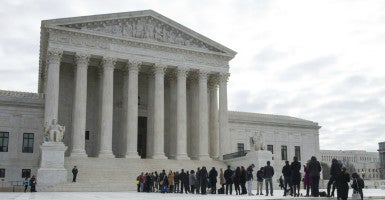Senate Republicans are abusing their constitutional authority by “blockading” any Supreme Court nominee put forward by President Barack Obama, progressive legal experts said Wednesday.
“This is not just an instance of the Senate refusing to do its duty. This is actually better understood as an unconstitutional power grab by the Senate,” Edward Fallone, an associate professor of law at Marquette University Law School, said during a press call hosted by the Leadership Conference on Civil and Human Rights.
The decision by the 11 Republicans on the Senate Judiciary Committee to halt the nomination and confirmation process until a new president is in the White House revived accusations from the left that GOP lawmakers are obstructing. Senate Republicans argue they are well within their authority not to move a nominee.
Erwin Chemerinsky, dean of the University of California Irvine School of Law, called “unprecedented” the Senate’s refusal to hold a hearing or consider a confirmation vote even before Obama nominates someone to replace Antonin Scalia, who died unexpectedly Feb. 13.
In U.S. history, Chemerinsky said, the Senate has confirmed 21 of 24 nominees appointed by a president in the last year of his term.
The Constitution grants the president the power to appoint justices to the Supreme Court with the “advice and consent” of the Senate.
Fallone argued that the founders made clear the Senate was to act as a check on the president’s power only to stymie the possibility of corruption but was not given equal authority to determine who should sit on the Supreme Court.
“This is not a 50-50 split,” he said. “The president has the absolute power to select anyone he or she chooses. The Senate’s power is limited to accepting or rejecting the nominee.”
The Republican-led Senate’s refusal to consider any nominee from Obama for the remainder of his second term, Fallone said, would exceed its constitutional limits because lawmakers are inserting themselves into the “prenomination” process delegated solely to the president.
In an open letter Tuesday to Senate Majority Leader Mitch McConnell, all 11 Republicans on the Judiciary Committee declared they would exercise their “constitutional authority to withhold consent on any nominee to the Supreme Court submitted by this president.”
Chairman Chuck Grassley, R-Iowa, and the 10 others argued that Americans should have an opportunity to decide who will name Scalia’s successor. They vowed to block any nominee until the next president takes office on Jan. 20.
“It’s not obstruction; this is saying that this is so important it should not be brought up in this messy time and it ought to be brought up by … the next president, whoever that may be—it could be a Democrat,” Sen. Orrin Hatch, R-Utah, told NPR on Tuesday.
But Chemerinsky warned this could leave the ninth Supreme Court seat open until spring of next year, nearly two court terms after Scalia’s death.
“There is no clause in Article II that says in an election year the president should not fill vacancies,” he said. “There’s no clause that says in an election year, the Senate should not give advice and consent—it is their constitutional duty.”
Melissa Hart, a professor of law and director of the Byron R. White Center at the University of Colorado Boulder, called Republicans’ decision to “politicize” judicial appointments “disturbing.”
“I would hope any senator, Republican or Democrat, would consider carefully the consequences of leaving the Supreme Court with only eight justices for most of two full terms and would not simply decide, without even knowing who the nominee might be, that this is a no vote,” Hart said.






























